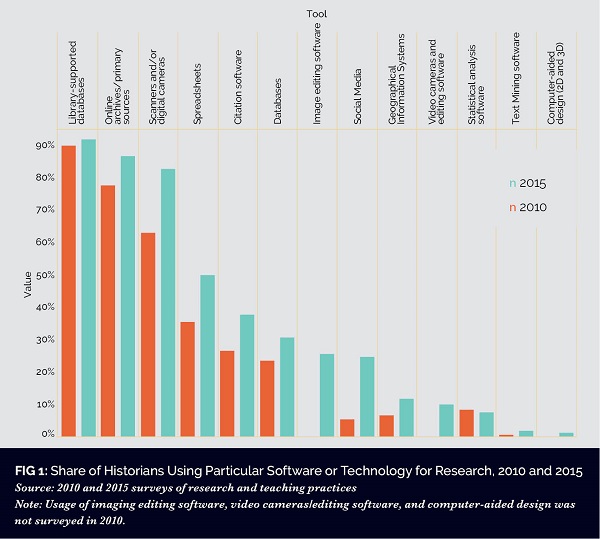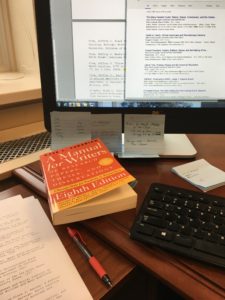Now that my latest book is out, people want to know how I found the time to write it. When your days are full of meetings, plus you teach every semester, plus you have a family that includes a tween and a teen, well, you need a plan. I admit that the way I went about producing Race, Place, and Memory differed significantly from the strategy I used for my previous publications, written when I was a tenure-track assistant professor. In fact, my advice won’t work for everyone who holds an administrative role, but I hope these tips prove useful.
- Schedule and HONOR Your #AcWri Time. I know, DUH, it seems self-evident, but if you don’t put it in your weekly calendar it won’t happen. Over the last decade, I’ve learned that how you block out time is less important than that you do it and honor that time just as you would your other professional commitments. For years, I resisted this idea because I had always excelled at “binge-writing” whenever and for as long as the spirit moved me. With a busy home-life on top of work, “snack-writing” proved essential because it helped me make progress, even if sometimes I only used my #AcWri time on footnotes (citations), outlining, or reading a journal article I’d found earlier. To be clear, “snack-writing” for me meant blocking out one day each week (Fridays); others use that term to mean an hour every day. Do what fits into YOUR schedule and keep that meeting with yourself.
- Hide Somewhere. I chose Fridays for my primary (read: scheduled) writing time because there are fewer classes, fewer people around, fewer distractions those days, but even so, I avoided my office. Let’s face it, a closed door doesn’t prevent colleagues from knocking to ask “a quick question.” (I do this to other people all the time, so I know the game.) My hide-out was an empty office in the faculty development center on the opposite side of campus from my office. Your center may have similar spaces, but even if it doesn’t ask around to see where other empty offices may be. I took a laptop, a briefcase of materials, and snacks with me, and I checked email only at lunchtime. Occasionally, I went downstairs on a coffee run, but in the main, I avoided places where I might run into people. That is also why I hid on campus instead of at home or in a local coffee shop. Your #AcWri time is way too precious to risk those 5-minute encounters that morph into an hour of chit-chat or a spontaneous business meeting–even the ones you initiate yourself because you just.can’t.help.it.
NOTE: I wrote in my regular office when I could, and I spent a lot of time at my dining room table. The interruptions and distractions at these locations were constant. I really wish I had hidden away earlier and more often. - Use All The Technology. A recent survey by the American Historical Association found that historians aren’t using technology as much as they might to facilitate scholarship. That’s a shame because there are so many new tools available. Refworks, for example, enabled me to build a bibliography whenever I was surfing WorldCat, and OneNote helped me keep track of notes from various books and articles over the years (and from writing location to writing location).

From “Historians and the Technologies of Research,” by Robert B. Townsend, October 2017. Link to the full article, above.
Because I started work on Race, Place, and Memory nearly two decades ago, much of my research was already complete when I discovered NVivo, a relational database, but I would use it for future projects to cross-reference different kinds of sources. For drafting, writing, and revising all the way through to copyediting the proofs, I relied extensively on Dropbox. Having the app on multiple devices meant I could work at home, in my office, my hideaway location, airports, hotels, wherever I happened to be.
- Give Papers at Small, Local or Regional Conferences. If you are a junior professor, presenting at the national conference in your discipline is the gold standard, but as an administrator, your travel budget and out-of-office time have to be used differently. I found that smaller conferences made more sense for these reasons: they were closer to home, often in driving distance, so the cost was less and I didn’t have to be away as long; they put me in contact with people in my area/state that I could network with more readily; and the smaller number of participants meant I received more and better feedback on my work.
- Get and Stay Connected. When I was in grad school, a wise person gave me some advice: “Never forget that you are part of a larger field.” What he meant was that academics often get tied up in the nitty-gritty politics of their departments and forget to connect with people doing similar work elsewhere. I think this tendency is even more prevalent among administrators than full-time faculty.
 That is certainly what happened to me–although I had a small group of colleagues who I could talk to about certain aspects of my research, I felt somewhat isolated as a scholar. So, to get (re)connected, I opened a Twitter account. Now, I know there are lots of reasons to avoid Twitter, but academic Twitter has been a godsend. People share articles, links to collections of primary sources, blog posts, calls for papers, and threaded conversations. Two Twitter colleagues even read and commented on drafts of my work. More that that, other academics offer #AcWri encouragement and support, whether in a few characters or a simple “like” when you vent your frustration. And there many days when I needed that kind of help.
That is certainly what happened to me–although I had a small group of colleagues who I could talk to about certain aspects of my research, I felt somewhat isolated as a scholar. So, to get (re)connected, I opened a Twitter account. Now, I know there are lots of reasons to avoid Twitter, but academic Twitter has been a godsend. People share articles, links to collections of primary sources, blog posts, calls for papers, and threaded conversations. Two Twitter colleagues even read and commented on drafts of my work. More that that, other academics offer #AcWri encouragement and support, whether in a few characters or a simple “like” when you vent your frustration. And there many days when I needed that kind of help.
So, there they are, my five tips for writing success. If you need more advice, check out Dr. Raul Pacheco-Vega’s extensive blog at raulpecheco.org. He is the generous genius behind the hashtag #ScholarSunday and a regular contributor to #AcWri and #GetYourManuscriptOut.
